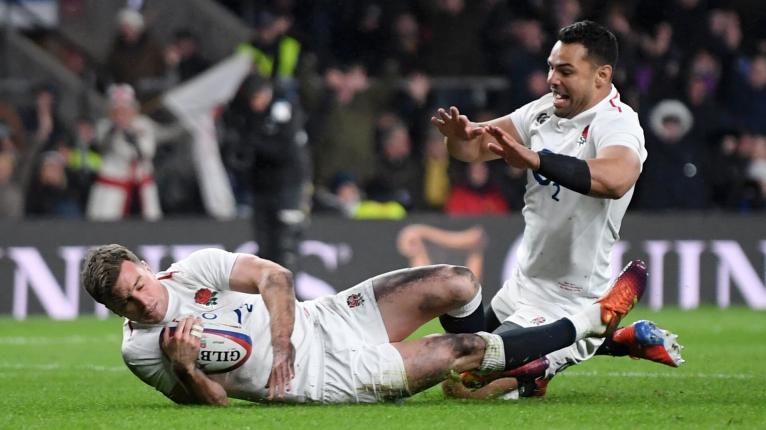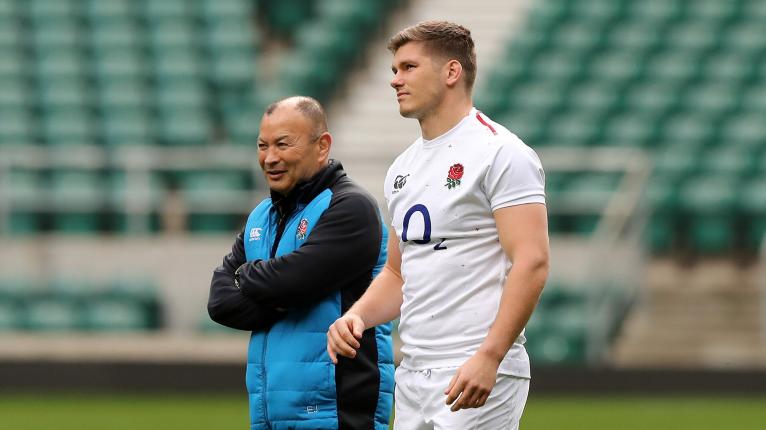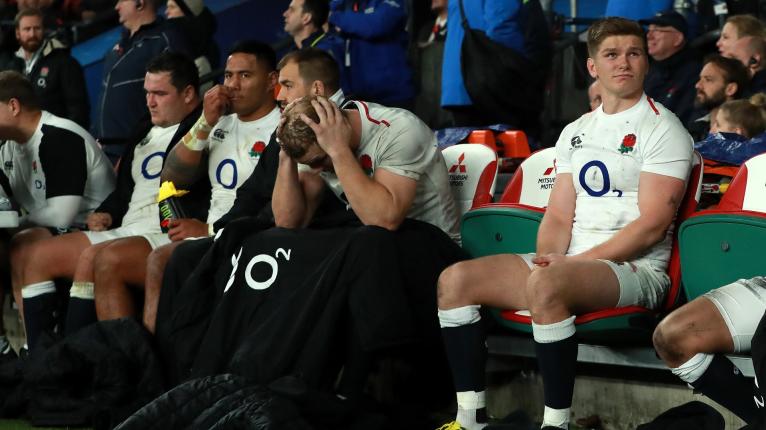Me, myself and I: England's split personalities are their strength and their weakness

DISCLAIMER: This article does not, nor does it attempt to, explain the utterly madcap result at Twickenham on Saturday afternoon. For that, please see Ben Smith’s excellent analysis of Scotland’s Finn Russell-inspired comeback here.
If you’re still struggling to digest or process what went on yesterday in south-west London, you’re not alone. It was one of the most bizarre 80 minutes of rugby you’re ever likely to see. Everything England excelled at in the first half vanished in the second, and everything Scotland struggled with before the interval was like taking candy from a baby after it.
If ever the cliché “a game of two halves” were to be used genuinely and without raising dull groans from everyone in earshot, this was it. It does, however, lead on to the subject of this piece.
England are suffering from dissociative identity disorder, known more commonly as multiple personality disorder.
Do England exhibit two or more “discrete identities or personality states” that are accompanied by memory loss that is not caused by drugs, alcohol – hang on, what was in England’s half time water bottles? – or medications?

There is no doubt there are two very different approaches to games that England have taken over the last six months, and both of them are significant alterations on the style with which Eddie Jones had England playing with earlier in his tenure.
That early style, with two playmakers at 10 and 12 and an ability to generate quick width and turn the corner with the pace of Jonathan Joseph, seems to currently be dormant. Sometimes Henry Slade will move inside to second receiver and you think it might resurface, but it is often just a decoy or a way to use Manu Tuilagi on an out-to-in line.
It’s there and we have all witnessed it since 2016, but for now it seems as if the other personalities have taken the driving seat.
We then have England’s kick-heavy, territorial approach. The consensus has been that this personality has really begun to exert itself since the beginning of the Guinness Six Nations, due to the success it achieved against Ireland and France, but there’s evidence to the contrary of that which we will come back to in a moment.
The final personality is all about the brute power. It loves to load up on physical carriers and attempt to pummel the opponent into submission. England deployed it against Italy to remarkably advantageous effect.
Continue reading below…
Watch: Ben Youngs reflects on a breathtaking Calcutta Cup match at Twickenham
So, to recap, there’s the dual-playmaker with width personality that currently seems to be dormant, the pragmatic and risk-adverse persona that loves to go to the boot, and then the menacing power-oriented identity that is all about being direct. You could call them Paul, George and Ringo.
If you examine some of the key statistics indicative of playing style, there is far less of a divide between what England did in the Six Nations and November tests, than has been talked about in recent weeks.
If you take the average passes made by starting centres during a game, England made 5.5 during the November tests and actually increased that in the Six Nations, making 6.4 per game. It’s worth noting that is heavily influenced by the game against Scotland, where Tuilagi and Slade combined for 18 passes. If you exclude that game, England’s Six Nations average drops to 3.5. It is a significant drop, but both figures are relatively low in comparison to other nations, with Grand Slam winners Wales averaging 8 per game as an example. To see the major divergence for England, you need to go back to the June series in South Africa, where they averaged 11.3 passes per game.

It would be remiss not include Elliot Daly in this conversation, with the full-back having been an incumbent in the team throughout these three international windows and one of the great positives he brings to the England team is his ability to pop up in the midfield as a second receiver or as a creative influence linking with the two wings. If you add his passes to the mix, England averaged a total (centres + full-back) of 15.7 passes in June, 9.5 in November and 13.6 in the Six Nations. Daly has bumped those averages by 4.4, 4 and 7.2 respectively.
It’s a mark of both Daly’s increasing comfort level in the 15 jersey and also that the Wasps man is picking up some of the slack when the centres have had different roles in the team, particularly with his ability to draw defenders on counter-attacks and then unleash support runners.
Some other numbers which have not varied that noticeably between the autumn and the Six Nations are back row passes, with England averaging 8 per game last year and 9.2 over the last seven weeks. One interesting facet of this is that Billy Vunipola averaged 5.8 passes per game during the Six Nations, however if you take the Scotland game out of the equation for a second, England averaged 7.5 back row passes per game and Vunipola alone was responsible for 60% of them.
Kicks from hand were surely up during the Six Nations, right?
Slightly, with 29.5 per game in the autumn and 33 in the Six Nations, and England’s ability to execute that sort of a game plan was validated by their possession percentage across the windows increasing from 42.25% to 43.8% and their territory moving from 41.75% to 48%. Neither possession nor territory is necessarily indicative of wins in the modern-day game, but to be able to increase those numbers, particularly possession, whilst also kicking more is impressive.
How about cutting it up by wins and losses, rather than international windows?

In wins over the last three international windows, England’s centres have averaged 5.1 passes, with that bumped to 10.1 with Daly’s involvements. In losses, England have averaged 8.5 passes in the centres and 14 after you add in Daly’s contributions. On the surface, that seems like less passing is a good thing, but that second set of data is extremely polarised. In the losses to New Zealand and Wales, England’s starting centres had just 1 and 3 passes respectively, whilst in the two losses to South Africa, they had 13 and 17. It is unlikely to be coincidence that there was much more balance in the seven wins over the same time period.
Focusing in now on just the Six Nations and November windows, when England have had the services of defence coach and transition specialist John Mitchell, England have averaged 35 kicks from hand in losses and 30.7 in wins. If you take the game against France out of the mix, which was by any judgement unusual, with France picking players out of position in the back three and allowing England to repeatedly attack them in the kicking game, the number drops to 27.4 kicks from hand on average in wins.
Lastly, from a statistical standpoint, the games where England opted to kick more heavily have generally returned a lower number of turnovers conceded.
| Game | Kicks from hand | Turnovers conceded |
| vs South Africa | 35 | 12 |
| vs New Zealand | 37 | 12 |
| vs Japan | 22 | 16 |
| vs Australia | 24 | 16 |
| vs Ireland | 32 | 11 |
| vs France | 47 | 21 |
| vs Wales | 33 | 13 |
| vs Italy | 24 | 16 |
| vs Scotland | 29 | 18 |
Again, the game against France proves to be a bit of an anomaly, but otherwise the trend of kicking more resulting in less turnovers rings true.
It can’t be proven statistically, nor will it be something Jones would ever publicly admit to, but it certainly looks as if England kick more and pass less against teams they consider to be more of a threat and play a more high-tempo, open brand of rugby against teams they don’t perceive to be. That’s nothing revolutionary, with teams having always done that to one degree or another, but the rigidity with which they stick to one particular style in a game has, at times, been problematic.
These contrasting styles of rugby, or personalities to maintain the analogy, don’t really seem to get along. They don’t pop up in the same game, helping one another to exploit certain scenarios, they watch on, waiting orderly for their turn.
Then there is England’s fourth personality and it is by far the most worrying. It’s the devil on the shoulder, feeding insecurities and urging them down the wrong path.

When England were struggling to break down Wales’ excellent back three in Cardiff and get around the line-speed the hosts were bringing close to the ruck, this personality – call it John – exerted itself. There was no adaptation on the fly, no diagnosis of what was going wrong and no formation of a plan to counter that.
Against Scotland, it seemingly did away with any and all of the positives of the other three personalities, tying them up at half time and deciding that only it could create the requisite chaos for England to throw away their 31-7 lead. Not before he nipped into the Scottish changing room and called them all a bunch of skirt-wearing, fried Mars bar-eating jessies, mind.
It’s a self-destructive personality and analogies aside, it’s a troubling trend of not being able to deal with adversity on the pitch.
The loss to Wales was understandable, Cardiff is a hostile environment for any team, let alone arch-rivals England, and the hosts were on course for a Grand Slam, but that doesn’t take away from England’s approach of repeating the same mistakes in that game and somehow expecting different results.
As for the draw with Scotland, England were simply unrecognisable after the interval. Momentum is at times an unquantifiable variable in sports, but to completely disintegrate in the fashion they did was shocking to even the most seasoned of sporting fans.
And it’s this demon lurking at the back of the minds that should worry English fans in an otherwise fairly productive Six Nations.
The three styles – or personalities – of England have all had success over this Rugby World Cup cycle and if Jones picks the right one for the right opponent, then England are capable of beating any side in the world. You would like to see a bit more in-game flexibility, but the truth is that that has not been required too often over the last six months. The game against Wales was the only one that felt like it required adjustments to be made and the fact they weren’t, and the game was lost, should prove a learning experience for the players and coaching staff moving forward.
That meltdown against Scotland, though. That was something else.
If England switch off like that in Japan later this year, that could be their Rugby World Cup over. Diagnosing what was at play there will be paramount for Jones, because it is something which could derail all of the positive work that he and England have put in over the last three years.
It will raise questions over leadership and captaincy, not to mention the role of the players as decision-makers on the field.
England have the ability, they have the depth and they have the array of talents to beat opponents in different ways, but it has to be pieced together by the players as much as the coaches, because there is very little the coaches can do in the stands during the heat of the battle. If England can nurture that in their senior leadership group on the field, they will be a match for anyone later this year.
Watch: Jack Nowell gives an honest assessment of his performance in the Calcutta Cup














































































